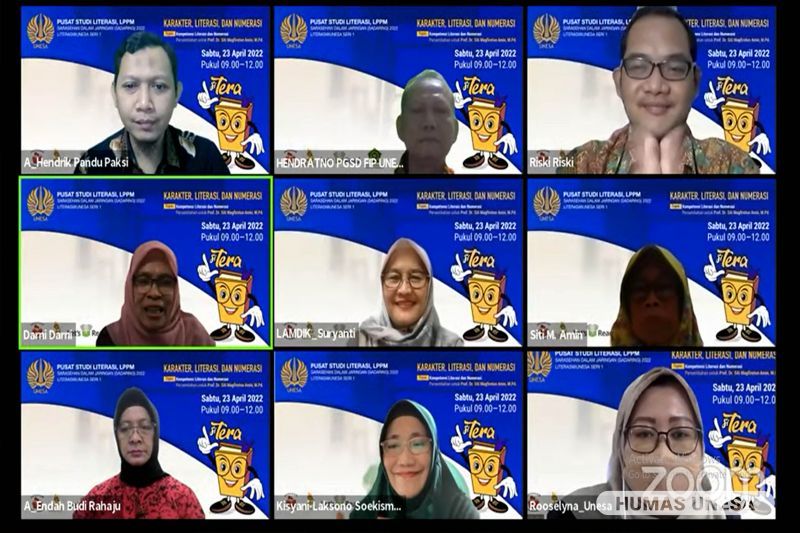
www.unesa.ac.id
Unesa.ac.id, SURABAYA-The literacy of the Indonesian generation must continue to be improved. For this reason, the Center for Literacy Studies, LPPM UNESA held a webinar for the 2022 Online Workshop (Sadaring) with the theme “Literacy and Numeracy Competence” on Saturday, 23 April 2022. The activity was attended by participants from teachers, the public and students.
As a presenter, present Prof. Dr. Siti Maghfirotun Amin, M.Pd, UNESA Retired Professor of Mathematics Education, Dr. Hendratno, M. Hum, Lecturer of PGSD FIP UNESA and Riski, M.Pd, Teacher of SDN Sidotopo 1/48 Surabaya.
On that occasion, Prof. Siti Maghfirotun Amin delivered material on strengthening numeracy competencies through learning mathematics with the PMRI approach. In numeracy, contextual problems are taught.
In contextual problems, students are taught to always think and discuss simple problems in their environment. Teachers must teach numeracy with contextual problems to students so that they can hone their thinking skills and discuss with other friends.
Dr. Hendratno conveyed that the literacy culture of the Indonesian nation had actually been going on for centuries. Many important figures in Indonesia have made many works showing that literacy culture in Indonesia has existed since ancient times. However, it is important for students today to be educated so that they can use their time well, especially in terms of literacy.
Literacy character education must be instilled from an early age. Then literacy character education is implemented in institutions or institutions that are expected to produce a generation of character in the future. It is also necessary to get used to reading various books for 15 minutes before learning begins which has a positive impact on the development of children's character. "Children's love for the world of literacy must be grown, trained and accustomed from an early age," he said.
In the next material session, Riski conveyed the practice of professional literacy and numeracy learning in elementary schools (SD). “This rule has been expected, in order to be able to assess our position as elementary school teachers whether it is still in the developing stage, worthy, capable, or proficient. But that does not mean clustering the ability of teachers in Indonesia. But to be able to reflect and improve our competence, which may not be close to being proficient," he said.
There are several things that need to be considered for teachers in improving literacy competence and literacy on a regular basis, including: professional literacy learning practices with literacy learning and assessment, mapping the diversity of students' reading and writing abilities, and managing a literacy-rich learning environment.
He also explained the explicit reading and writing model that he had obtained from the Reading & Writing Workshop by Teacher College Reading Writing Project, Columbia University, The USA, namely Minilesson (for 15 minutes), independent reading, conferring, small ground activity (for 35 minutes). minutes), and share (for 10 minutes). He also gave suggestions that teachers should be sensitive if there are children who have not been able to understand the material presented by trying to practice workshop teaching by re-teaching and providing help sentences for children who have not been able to totally understand the material that has been conveyed by the teacher. (UNESA PR)
Author: Ulum Izzati
Editor: @zam*
Share It On:






